- Home
- Franz Kafka
The Diaries of Franz Kafka Page 26
The Diaries of Franz Kafka Read online
Page 26
4 May. Always the image of a pork butcher’s broad knife that quickly and with mechanical regularity chops into me from the side and cuts off very thin slices which fly off almost like shavings because of the speed of the action.
Early one morning, the streets were still empty up and down their length and breadth, a man, he was in his bare feet and wore only a nightshirt and trousers, opened the door of a large tenement on the main street. He seized the two sections of the door and took a deep breath. ‘Misery, oh, damned misery,’ he said and looked, apparently calmly, first along the street and then at some houses.
Despair from this direction too. Nowhere a welcome.
1. Digestion. 2. Neurasthenia. 3. Rash. 4. Inner insecurity.
24 May. Walk with Pick.56 In high spirits because I consider ‘The Stoker’ so good. This evening I read it to my parents, there is no better critic than I when I read to my father, who listens with the most extreme reluctance. Many shallow passages followed by unfathomable depths.
5 June. The inner advantages that mediocre literary works derive from the fact that their authors are still alive and present behind them. The real sense of growing old.
Löwy, story about crossing the frontier.
21 June. The anxiety I suffer from all sides. The examination by the doctor, the way he presses forward against me, I virtually empty myself out and he makes his empty speeches into me, despised and unrefuted.
The tremendous world I have in my head. But how free myself and free it without being torn to pieces. And a thousand times rather be torn to pieces than retain it in me or bury it. That, indeed, is why I am here, that is quite clear to me.
On a cold spring morning about five o’clock a tall man in a cloak that reached to his feet knocked with his fist against the door of a small hut which stood in a bare, hilly region. The moon was still white and bright in the sky. After each blow of his fist he listened, within the hut there was silence.
1 July. The wish for an unthinking, reckless solitude. To be face to face only with myself. Perhaps I shall have it in Riva.
Day before yesterday with Weiss,57 author of Die Galeere. Jewish physician, Jew of the kind that is closest to the type of the Western European Jew and to whom one therefore immediately feels close. The tremendous advantage of Christians who always have and enjoy such feelings of closeness in general intercourse, for instance a Christian Czech among Christian Czechs.
The honeymoon couple that came out of the Hotel de Saxe. In the afternoon. Dropping the card in the mailbox. Wrinkled clothing, lazy pace, dreary, tepid afternoon. Faces scarcely individualized at first sight.
The picture of the celebration of the Romanov tercentenary in Yaroslavl on the Volga. The Tsar, the annoyed princesses standing in the sun, only one – delicate, elderly, indolent, leaning on her parasol – is looking straight ahead. The heir to the throne on the arm of the huge, bareheaded Cossack. In another picture, men who had long since passed by are saluting in the distance.
The millionaire in the motion picture Slaves of Gold. Mustn’t forget him. The calmness, the slow movement, conscious of its goal, a faster step when necessary, a shrug of the shoulder. Rich, spoiled, lulled to sleep, but how he springs up like a servant and searches the room into which he was locked in the forest tavern.
2 July. Wept over the report of the trial of twenty-three-year-old Marie Abraham who, because of poverty and hunger, strangled her not quite nine-month-old child, Barbara, with a man’s tie that she used as a garter. Very routine story.
The fire with which, in the bathroom, I described to my sister a funny motion picture. Why can I never do that in the presence of strangers?
I would never have married a girl with whom I had lived in the same city for a year.
3 July. The broadening and heightening of existence through marriage. Sermon text. But I almost sense it.
When I say something it immediately and finally loses its importance, when I write it down it loses it too, but sometimes gains a new one.
A band of little golden beads around a tanned throat.
19 July. Out of a house there stepped four armed men. Each held a halberd upright before him. Now and then one of them looked to the rear to see whether he was coming on whose account they were standing here. It was early in the morning, the street was entirely empty.
So what do you want? Come! – We do not want to. Leave us!–
All the inner effort just for this! That is why the music from the coffee-house rings so in one’s ear. The stone’s throw about which Elsa B. spoke becomes visible.
[A woman is sitting at the distaff. A man pushes the door open with a sword which is sheathed in its scabbard (he is holding it loosely in his hand).]
MAN: He was here!
WOMAN: Who? What do you want?
MAN: The horse thief. He is hiding here. Don’t lie! [He brandishes the sword.]
WOMAN [raising the distaff to protect herself]: No one was here. Let me alone!
20 July. Down on the river lay several boats, fishermen had cast their lines, it was a dreary day. Some youths, their legs crossed, were leaning against the railing of the dock.
When they rose to toast her departure, lifting up their champagne glasses, the dawn had already broken. Her parents and several wedding guests escorted her to the carriage.
21 July. Don’t despair, not even over the fact that you don’t despair. Just when everything seems over with, new forces come marching up, and precisely that means that you are alive. And if they don’t then everything is over with here, once and for all.
I cannot sleep. Only dreams, no sleep. Today, in my dream, I invented a new kind of vehicle for a park slope. You take a branch, it needn’t be very strong, prop it up on the ground at a slight angle, hold one end in your hand, sit down on it side-saddle, then the whole branch naturally rushes down the slope, since you are sitting on the bough you are carried along at full speed, rocking comfortably on the elastic wood. It is also possible to use the branch to ride up again. The chief advantage, aside from the simplicity of the whole device, lies in the fact that the branch, thin and flexible as it is, can be lowered or raised as necessary and gets through anywhere, even where a person by himself would get through only with difficulty.
To be pulled in through the ground-floor window of a house by a rope tied around one’s neck and to be yanked up, bloody and ragged, through all the ceilings, furniture, walls, and attics, without consideration, as if by a person who is paying no attention, until the empty noose, dropping the last fragments of me when it breaks through the roof tiles, is seen on the roof.
Special methods of thinking. Permeated with emotion. Everything feels itself to be a thought, even the vaguest feelings (Dostoyevsky).
This block and tackle of the inner being. A small lever is somewhere seemly released, one is hardly aware of it at first, and at once the whole apparatus is in motion. Subject to an incomprehensible power, as the watch seems subject to time, it creaks here and there, and all the chains clank down their prescribed path one after the other.
Summary of all the arguments for and against my marriage:
1. Inability to endure life alone, which does not imply inability to live, quite the contrary, it is even improbable that I know how to live with anyone, but I am incapable, alone, of bearing the assault of my own life, the demands of my own person, the attacks of time and old age, the vague pressure of the desire to write, sleeplessness, the nearness of insanity – I cannot bear all this alone. I naturally add a ‘perhaps’ to this. The connexion with F. will give my existence more strength to resist.
2. Everything immediately gives me pause. Every joke in the comic paper, what I remember about Flaubert and Grillparzer, the sight of the nightshirts on my parents’ beds, laid out for the night, Max’s marriage. Yesterday my sister said, ‘All the married people (that we know) are happy, I don’t understand it,’ this remark too gave me pause, I became afraid again.
3. I must be alone a great deal. What I accomplished
was only the result of being alone.
4. I hate everything that does not relate to literature, conversations bore me (even if they relate to literature), to visit people bores me, the sorrows and joys of my relatives bore me to my soul. Conversations take the importance, the seriousness, the truth of everything I think.
5. The fear of the connexion, of passing into the other. Then I’ll never be alone again.
6. In the past, especially, the person I am in the company of my sisters has been entirely different from the person I am in the company of other people. Fearless, powerful, surprising, moved as I otherwise am only when I write. If through the intermediation of my wife I could be like that in the presence of everyone! But then would it not be at the expense of my writing? Not that, not that!
7. Alone, I could perhaps some day really give up my job. Married, it will never be possible.
In our class, the fifth class of the Amalia Gymnasium, there was a boy named Friedrich Guss whom we all hated very much. If we came into the classroom early and saw him sitting in his place near the stove we could hardly understand how he could have pulled himself together to come to school again. But I’m not telling it right. We didn’t hate only him, we hated everyone. We were a terrible confederacy. Once, when the District School Inspector was present at a lesson – it was a geography lesson and the professor, his eyes turned to the blackboard or the window like all our professors, was describing the Morea Peninsula –
It was the first day of school, evening was already approaching. The professors of the Obergymnasium were still sitting in the staff-room, studying the lists of pupils, preparing new roll books, talking about their vacation trips.
Miserable creature that I am!
Just whip the horse properly! Dig the spurs into him slowly, then pull them out with a jerk, but now let them bite into the flesh with all your strength.
What an extremity!
Were we crazy? We ran through the park at night swinging branches.
I sailed a boat into a small, natural bay.
While I was at the Gymnasium, now and then I used to visit a certain Josef Mack, a friend of my dead father. When, after graduation from the Gymnasium, I –
While he was at the Gymnasium Hugo Seifert now and then used to pay a visit to a certain Josef Kiemann, an old bachelor who had been a friend of Hugo’s dead father. The visits suddenly ceased when Hugo, who received the offer of a job abroad which he had to accept at once, left his home town for several years. When he returned he intended to visit the old man, but he found no opportunity, perhaps such a visit would not have suited his changed views, and although he often went through the street where Kiemann lived and several times even saw him leaning out of the window and was probably noticed by him too, he neglected to pay the visit.
Nothing, nothing, nothing. Weakness, self-destruction, tip of a flame of hell piercing the floor.
23 July. With Felix in Rostock. The bursting sexuality of the women. Their natural impurity. The flirtation, senseless for me, with little Lena. The sight of a stout woman hunched up in a basket chair, one foot curiously pushed backwards, who was sewing something and talking to an old woman, probably an old spinster, whose teeth appeared unusually large on one side of her mouth. The full-bloodedness and wisdom of the pregnant woman. Her behind almost faceted by evenly divided planes. The life on the small terrace. How I coldly took the little girl on my lap, not at all unhappy about the coolness.
How childishly a tinker, seen through the open door of his shop, sits at his work and keeps striking with his hammer.
Roskoff, History of the Devil: Among the present-day Caribs, ‘he who works at night’ is regarded as the creator of the world.
13 August. Perhaps everything is now ended and the letter I wrote yesterday was the last one. That would certainly be the best. What I shall suffer, what she will suffer – that cannot be compared with the common suffering that would result. I shall gradually pull myself together, she will marry, that is the only way out among the living. We cannot beat a path into the rock for the two of us, it is enough that we wept and tortured ourselves for a year. She will realize this from my last letters. If not, then I will certainly marry her, for I am too weak to resist her opinion about our common fortune and am unable not to carry out, as far as I can, something she considers possible.
Yesterday evening on the Belvedere under the stars.
14 August. The opposite has happened. There were three letters. The last letter I could not resist. I love her as far as I am capable of it, but the love lies buried to the point of suffocation under fear and self-reproaches.
Conclusion for my case from ‘The Judgement’. I am indirectly in her debt for the story. But Georg goes to pieces because of his fiancée.
Coitus as punishment for the happiness of being together. Live as ascetically as possible, more ascetically than a bachelor, that is the only possible way for me to endure marriage. But she?
And despite all this, if we, I and F., had equal rights, if we had the same prospects and possibilities, I would not marry. But this blind alley into which I have slowly pushed her life makes it an unavoidable duty for me, although its consequences are by no means unpredictable. Some secret law of human relationship is at work here.
I had great difficulty writing the letter to her parents, especially because a first draft, written under particularly unfavourable circumstances, for a long time resisted every change. Today, nevertheless, I have just about succeeded, at least there is no untruth in it, and after all it is still something that parents can read and understand.
15 August. Agonies in bed towards morning. Saw only solution in jumping out of the window. My mother came to my bedside and asked whether I had sent off the letter and whether it was my original text. I said it was the original text, but made even sharper. She said she does not understand me. I answered, she most certainly does not understand me, and by no means only in this matter. Later she asked me if I were going to write to Uncle Alfred, he deserved it. I asked why he deserved it. He has telegraphed, he has written, he has your welfare so much at heart. ‘These are simply formalities,’ I said, ‘he is a complete stranger to me, he misunderstands me entirely, he does not know what I want and need, I have nothing in common with him.’
‘So no one understands you,’ my mother said, ‘I suppose I am a stranger to you too, and your father as well. So we all want only what is bad for you.’
‘Certainly, you are all strangers to me, we are related only by blood, but that never shows itself. Of course you don’t want what is bad for me.’
Through this and several other observations of myself I have come to believe that there are possibilities in my ever-increasing inner decisiveness and conviction which may enable me to pass the test of marriage in spite of everything, and even to steer it in a direction favourable to my development. Of course, to a certain extent this is a belief that I grasp at when I am already on the window sill.
I’ll shut myself off from everyone to the point of insensibility. Make an enemy of everyone, speak to no one.
The man with the dark, stern eyes who was carrying the pile of old coats on his shoulder.
LEOPOLD S. [a tall, strong man, clumsy, jerky movements, loosely hanging, wrinkled, checked clothes, enters hurriedly through the door on the right into the large room, claps his hands, and shouts]: Felice! Felice! [Without pausing an instant for a reply to his shout he hurries to the middle door which he opens, again shouting] Felice!
FELICE S. [enters through the door at the left, stops at the door, a forty-year-old woman in a kitchen apron]: Here I am, Leo. How nervous you have become recently! What is it you want?
LEOPOLD [turns with a jerk, then stops and bites his lips]: Well, then, come over here! [He walks over to the sofa.]
FELICE [does not move]: Quick! What do you want? I really have to go back to the kitchen.
LEOPOLD [from the sofa]: Forget the kitchen! Come here! I want to tell you something important. It will make up for i
t. All right, come on!
FELICE [walks towards him slowly, raising the shoulder straps of her apron]: Well, what is it that’s so important? If you’re making a fool of me I’ll be angry, seriously. [Stops in front of him.]
LEOPOLD: Well, sit down, then.
FELICE: And suppose I don’t want to?
LEOPOLD: Then I can’t tell it to you. I must have you close to me.
FELICE: All right, now I am sitting.
21 August. Today I got Kierkegaard’s Buch des Richters.58 As I suspected, his case, despite essential differences, is very similar to mine, at least he is on the same side of the world. He bears me out like a friend. I drafted the following letter to her father, which, if I have the strength, I will send off tomorrow.
You hesitate to answer my request, that is quite understandable, every father would do the same in the case of any suitor. Hence your hesitation is not the reason for this letter, at most it increases my hope for a calm and correct judgement of it. I am writing this letter because I fear that your hesitation or your considerations are caused by more general reflections, rather than by that single passage in my first letter which indeed makes them necessary and which might have given me away. That is the passage concerning the unbearableness of my job.
You will perhaps pass over what I say, but you shouldn’t, you should rather inquire into it very carefully, in which case I should carefully and briefly have to answer you as follows. My job is unbearable to me because it conflicts with my only desire and my only calling, which is literature. Since I am nothing but literature and can and want to be nothing else, my job will never take possession of me, it may, however, shatter me completely, and this is by no means a remote possibility. Nervous states of the worst sort control me without pause, and this year of worry and torment about my and your daughter’s future has revealed to the full my inability to resist. You might ask why I do not give up this job and – I have no money – do not try to support myself by literary work. To this I can make only the miserable reply that I don’t have the strength for it, and that, as far as I can see, I shall instead be destroyed by this job, and destroyed quickly.

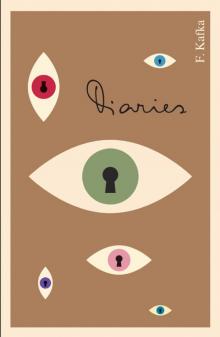 Diaries of Franz Kafka
Diaries of Franz Kafka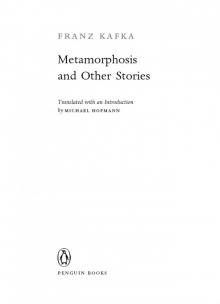 Metamorphosis and Other Stories
Metamorphosis and Other Stories The Castle: A New Translation Based on the Restored Text
The Castle: A New Translation Based on the Restored Text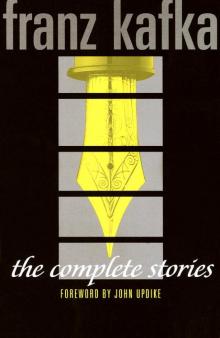 The Complete Stories
The Complete Stories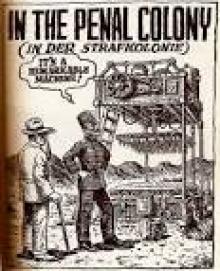 In the Penal Colony
In the Penal Colony The Trial
The Trial Amerika
Amerika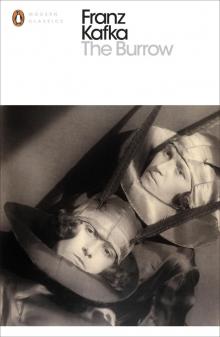 The Burrow: Posthumously Published Short Fiction
The Burrow: Posthumously Published Short Fiction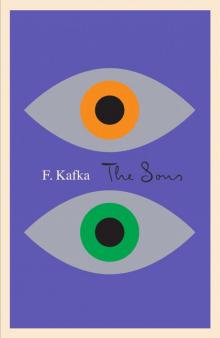 Sons
Sons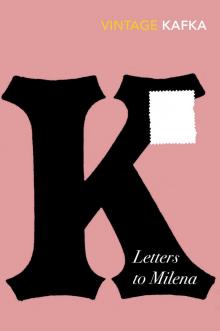 Letters to Milena
Letters to Milena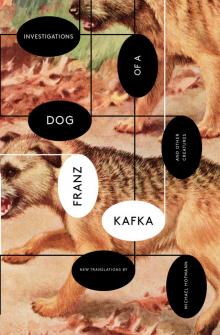 Investigations of a Dog: And Other Creatures
Investigations of a Dog: And Other Creatures Collected Stories
Collected Stories The Great Wall of China
The Great Wall of China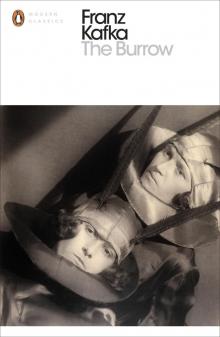 The Burrow
The Burrow The Castle
The Castle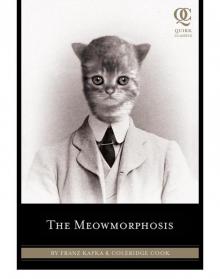 The Meowmorphosis
The Meowmorphosis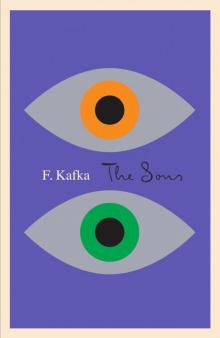 The Sons
The Sons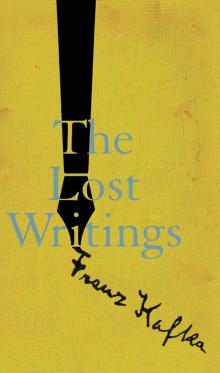 The Lost Writings
The Lost Writings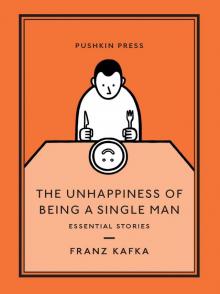 The Unhappiness of Being a Single Man
The Unhappiness of Being a Single Man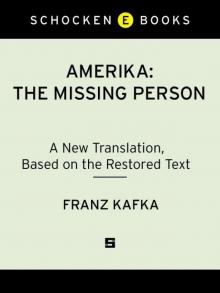 Amerika: The Missing Person: A New Translation, Based on the Restored Text
Amerika: The Missing Person: A New Translation, Based on the Restored Text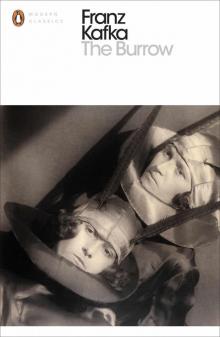 The Burrow: Posthumously Published Short Fiction (Penguin Modern Classics)
The Burrow: Posthumously Published Short Fiction (Penguin Modern Classics)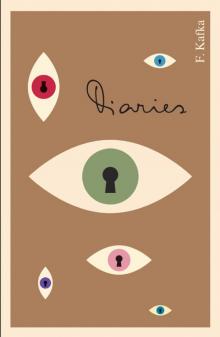 The Diaries of Franz Kafka
The Diaries of Franz Kafka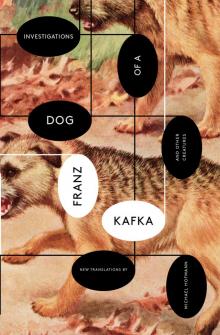 Investigations of a Dog
Investigations of a Dog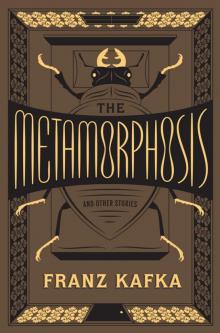 The Metamorphosis and Other Stories
The Metamorphosis and Other Stories The Trial: A New Translation Based on the Restored Text
The Trial: A New Translation Based on the Restored Text